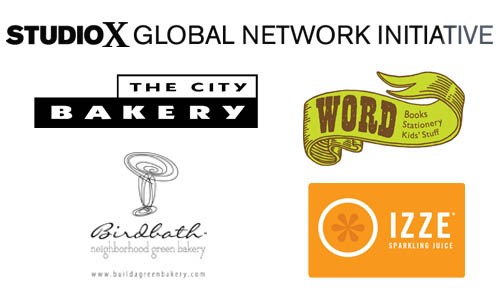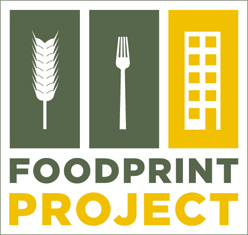Foodprint NYC was the first in a series of international conversations about food and the city. From a cluster analysis of bodega inventories to the cultural impact of the ice-box, and from food deserts to peak phosphorus, panelists examined the hidden corsetry that gives shape to urban foodscapes, and collaboratively speculated on how to feed New York in the future.
The free afternoon program included designers, policy-makers, flavor scientists, culinary historians, food retailers, and others, for a wide-ranging discussion of New York’s food systems, past and present, as well as opportunities to transform our edible landscape through technology, architecture, legislation, and education.
You can watch it all online on our archive page or on our Vimeo channel. You can also buy an edited and illustrated transcript of the afternoon’s conversation as a perfect-bound pamphlet — Volume 1 of the Foodprint Papers — online at Lulu, where your purchase will help support future Foodprint Project events.
Date: Saturday, February 27
Time: 1 p.m. to 5:30 p.m.
Location: Studio-X (180 Varick St., Suite 1610, New York, NY 10014)
Free and open to the public
Program Schedule:
Zoning Diet: Sean Basinski, Joel Berg, Nevin Cohen, Stanley Fleishman
Culinary Cartography: Jonathan Bogarín, Makalé Faber Cullen, David Haskell, Naa Oyo A. Kwate
Edible Archaeology: Rebecca Federman, William Grimes, Annie Hauck-Lawson, David Sax
Feast, Famine, and Other Scenarios: Amale Andraos, Marcelo Coelho, Natalie Jeremijenko, Beverly Tepper

Zoning Diet
(1:00 to 1:55 p.m.)
How do zoning, policy, and economics shape New York City’s food systems?
Sean Basinski is the Founder and Director of the Street Vendor Project, a member-based advocacy group for street vendors’ rights at the Urban Justice Center. He is a lawyer, and former street-food vendor himself.Joel Berg
Joel Berg is the author of All You Can Eat: How Hungry is America? and the Executive Director of the New York City Coalition Against Hunger. He is a former senior USDA official and policy analyst, and his work has won the US Secretary of Agriculture’s Honor Award for Superior Service, and the Congressional Hunger Center’s Mickey Leland National Hunger Fighter Award.Nevin Cohen
Nevin Cohen is an Assistant Professor of Urban Studies at The New School, where his research and teaching is focused on urban food systems, citizen participation, and the environment. He was responsible for developing landmark municipal recycling, water conservation, and clean fuel laws in New York City as an analyst for the City Council and Manhattan Borough President.
Stanley Fleishman
Stanley Fleishman is the President and CEO, Jetro Cash & Carry/Restaurant Depot, a major supplier of wholesale commodities for foodservice businesses.
Moderator: Nicola Twilley, Edible Geography
Culinary Cartography
(2:00 to 2:55 p.m.)
What can we learn when we map New York City using food as the metric?
Jonathan is a New York born, New York-based artist and educator. His work spans the disciplines of painting, film, and community artworks made in collaboration with youth. As a Teaching Artist at the Center for Urban Pedagogy, he co-created Bodega Down Bronx, a 29-minute video that investigates New York City’s bodegas in terms of their owners, suppliers, inventory, clientele, and more.Makalé Faber Cullen
Makalé Faber Cullen is a cultural anthropologist and contributor to Renewing America’s Food Traditions: Saving and Savoring the Continent’s Most Endangered Foods. She is the former director of the RAFT, Ark, and Presidia initiatives of Slow Food USA. Prior to working with Slow Food, she developed in-school and public programs for City Loreand the Smithsonian’s Festival of American Folklife.David Haskell
David Haskell is a Senior Editor at New York magazine, and formerly the Executive Director of the Forum for Urban Design. As the co-founder of Kings County Distillery, the first distillery in New York City since prohibition, he is also at the forefront of the recent micro-local, artisanal Williamsburg-based food geography.
Naa Oyo A. Kwate
Naa Oyo is assistant professor of Sociomedical Sciences at the Mailman School of Public Health, Columbia University. Her research centers on determinants of African American health, with particular attention to individual and neighborhood inequality, including perceptions of racism and food environments. She was recently awarded the National Institutes of Health Director’s New Innovator Award, a research grant designed to support exceptionally creative new investigators who propose highly innovative projects that have the potential for unusually high impact.
Moderators: Nicola Twilley and Sarah Rich
Edible Archaeology
(3:30 to 4:25 p.m.)
How has today’s food culture in New York been shaped by social changes, economic fluctuations, and technological innovations throughout the city’s history?
Rebecca Federman is the electronic resources coordinator for the New York Public Library, and the librarian for the NYPL’s culinary collections. She is also the author of Cooked Books, where she discusses some of her favorite finds from NYPL’s vast archive of historic menus and cookbooks.William Grimes
William Grimes was the restaurant critic at the New York Times from 1999 to 2004. He is the author of several books, including Straight Up or on the Rocks, My Fine Feathered Friend, Eating Your Words: 2000 Words to Tease Your Taste Buds, and most recently Appetite City: A Culinary History of New York. Currently, Grimes is an obituary writer at the Times.Annie Hauck-Lawson
Annie Hauck-Lawson is an associate professor at Brooklyn College and co-editor of the book Gastropolis: Food and New York City, with Jonathan Deutsch, as well as the originator of the term food voice, a concept for exploring ways that food serves as channels of communication and avenues of identity for individuals and groups of people. Annie is a Master Composter and grows, gathers, prepares and composts food in Brooklyn.
David Sax
David Sax is the author of Save the Deli, a cultural history and travelogue of the Jewish delicatessen business, which was a Los Angeles Times bestseller. He is a freelance journalist whose work has appeared in New York,Vanity Fair, GQ, Gourmet, and others. He is from Toronto, and prays for Canada’s golden moment in the hockey finals.
Moderator: Sarah Rich
Feast, Famine, and Other Scenarios
(4:30 to 5:25 p.m.)
What are the opportunities and challenges of New York City’s possible food futures?
Amale Andraos is an architect and the co-principal of WORKac. Recent completed projects include the installation ‘Public Farm 1’ at PS1/MoMA, ‘New-Ark, Mega-Agropolis‘ for Pioneers of Change, Governor’s Island, and the publication of 49 Cities, an investigation of the relationship between ecology and urbanism. Current work includes the first Edible Schoolyard in New York City with Alice Waters’ Chez Panisse Foundation. In 2009, WORKac was honored at the White House as Finalist for a National Design Award.Marcelo Coelho
Marcelo Coelho is a designer and researcher whose recent project, Cornucopia: Digital Gastronomy, in collaboration with Amit Zoran, proposes a three-dimensional printer for food. Earlier work includes Dinnerware, prototypes for a digital place setting that responds to both the properties of the food it contains and the diner’s gestures. Coelho is currently a PhD candidate at the MIT Media Lab.Natalie Jeremijenko
Natalie Jeremijenko is an artist whose background includes studies in biochemistry, physics, neuroscience and precision engineering. She directs the xDesign Environmental Health Clinic at NYU, where she is also assistant professor in Art. Her projects include the Cross Species Dinners and Cookbook, featuring dishes and recipes that explore the gastronomy of nonhuman urban dwellers, as well as the Urban Space Station, a distributed urban agriculture and parasitic architecture project. A 1999 Rockefeller Fellow, she was recently named one of the 40 most influential designers by I.D. Magazine.
Beverly Tepper
Beverly Tepper is a Professor in the Department of Food Science at Rutgers University, where she is also director of the Sensory Evaluation Laboratory. She studies the genetics of taste and taste changes in disease, such as diabetes. The goal of her research is to combine food sensory science with nutritional science and psychology to better understand the links between taste, diet and health.
Moderator: Geoff Manaugh, BLDGBLOG
Foodprint NYC is grateful for the support of our generous host, Studio-X New York, and our sponsors, IZZE and City Bakery.

Book sales at Foodprint NYC are kindly provided by WORD, an independent bookstore in Greenpoint, Brooklyn.



